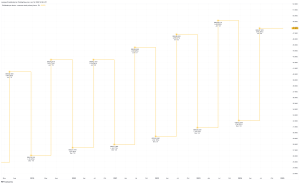If investors hadn’t heard of Nvidia before 2024, they almost certainly will have now, with the stock skyrocketing since the turn of the year. But is it the best listed technology company to buy for the long term at current prices? Four of our free-site writers think otherwise…
Alphabet
What it does: Alphabet owns and operates a variety of digital services, from Googleto YouTube
By Christopher Ruane. Compared to the five-year gain in Nvidia stock (2,703%), the 223% increase in Alphabet (NASDAQ: GOOG) over that period may look weak.
In fact, few companies of Alphabet’s scale more than triple in value over five years.
Compared to Nvidia, it benefits from having a widely diversified range of businesses used daily by billions of people and corporate clients.
AI has helped turbocharge Nvidia’s valuation. While AI presents opportunities for Alphabet too, it also poses risks. The core search business could see demand slump, hurting the cash cow.
But Alphabet had proven its business model and enormous profitability before AI became a hot topic and I expect that to continue.
The company has always thrived on disruptive innovation, owns large brands and has sticky products with huge customer bases. I see those as long-term strengths.
Revenues last year topped $300bn, while net income was a whopping $74bn, two and half times higher than Nvidia’s.
Christopher Ruane owns shares in Alphabet.
Raspberry Pi
What it does: Raspberry Pi makes cheap Linux computers that are ideal for control and robotics applications.
By Alan Oscroft. Since IPO, the Raspberry Pi (LSE: RPI) share price has shown almost no overall movement. That’s a bit of a disappointing start.
It’s all about artificial intelligence (AI) these days, and the robotics side of that surely offers great potential for small, cheap computers designed for control applications.
Raspberry Pi computers are tiny, and just think of the computing power you could get from a few dozen of those tucked in the nooks and crannies of a Tesla robotaxi, or a competing vehicle.
Valuing the stock is so tricky that I’m not going to try. But it has to be cheap compared to those soaring Nasdaq stocks, surely? Valuation is also the big risk. If I buy some Raspberry Pi shares, I’ll essentially be buying blind on that score, and hoping.
So it would only be a small purchase for me. But I might go for it with my next batch of investment cash.
Alan Oscroft has no position in Raspberry Pi or Tesla.
Scottish Mortgage Investment Trust
What it does: Scottish Mortgage Investment Trust aims to identify, own, and support the world’s most exceptional growth companies.
By Paul Summers. It’s hard not to be positive on the long-term outlook for Nvidia stock. The trouble is that market expectations are astronomically high. I reckon this makes it likely that the shares will have a sustained wobble before long.
I’d rather invest my hard-earned cash into a fund that contains some, but not too much, exposure to the chip maker.
Scottish Mortgage (LSE: SMT) seeks to own the best growth stocks going, many of which are tech-related. At almost 10%, Nvidia is its largest holding. But should the latter tank as a result of missing earnings estimates, the rest of its portfolio should help to limit the damage. Naturally, a whole-sector sell-off would be more painful.
Having struggled for momentum in recent years, the trust trades at a discount to net assets. I’m not sure this will remain the case as interest rates are cut.
Paul Summers owns shares in Scottish Mortgage Investment Trust
Volex
What it does: Volex manufactures electrical cords and cables, including those used extensively in data centres.
Nvidia isn’t the only ‘pick and shovel’ stock that investors can buy to profit from the AI revolution. While the US company supplies microchips, London-listed Volex (LSE:VLX) provides the cables that keep data centres up and running.
The data-intensive nature of AI means that demand for high-speed Direct Attach Cables (DAC) is flying. Thanks in part to this new tech phenomenon, revenues from Volex’s Complex Industrial Technology division soared 35.4% in the 12 months to March (to $213.4m), with sales to data centres increasing 131% year on year.
The AIM business is currently embarked on a five-year growth strategy to turbocharge revenues, too. It hopes to print group revenues of $1.2bn by 2027, up from $912.8m last year. Plans include building 800 gigabit-per-second cables that improve power efficiency, reduce data loss and boost signal integrity, all of which are essential for AI applications.
Volex operates in a highly competitive market. But the pace of industry growth — combined with the firm’s robust relationships with leading tech companies — still makes it a top AI stock to consider, in my opinion.
Royston Wild does not own shares in Volex.
This post was originally published on Motley Fool







